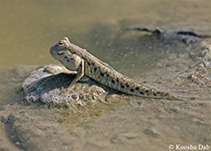|
Periophthalmus waltoni Koumans, 1941 Walton's mudskipper |

|
|
photo by
Dab, K. |
| Family: | Oxudercidae (Mudskippers), subfamily: Periophthalminae | |||
| Max. size: | 15 cm TL (male/unsexed) | |||
| Environment: | demersal; freshwater; brackish; marine | |||
| Distribution: | Western Indian Ocean: Persian Gulf to Pakistan. | |||
| Diagnosis: | Dorsal spines (total): 10-13; Dorsal soft rays (total): 12-13; Anal spines: 1-1; Anal soft rays: 10-11. Distinguished by the following characteristics: moderate to strong frenum uniting pelvic fins; medially, pelvic fins united for about one half their length; D I height moderate, its margin slightly rounded, no stripe on fin with only a few white spots posteriorly, no elongate spines; D2 with single dusky stripe inframarginally; dorsal fins not connected by membrane; D I with 10-13 spines; longitudinal scale count 91-121; head width 13.7-21.9% SL; pelvic fin length 11.8-13.9% SL; length of anal fin base 16.2-21.0% SL; length ofD2 base 23.2-27.2% SL; total D2 elements 13-14; total anal fin elements 11-12; TRDB 21-28 (Ref. 5218). | |||
| Biology: | Found on mud flats. Amphibious air-breather (Ref. 31184). Feeds on variety of ocypodid crabs (Ref. 92840). | |||
| IUCN Red List Status: | Least Concern (LC); Date assessed: 20 June 2017 Ref. (130435) | |||
| Threat to humans: | harmless | |||